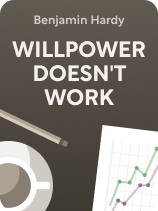

This article is an excerpt from the Shortform book guide to "Willpower Doesn't Work" by Benjamin Hardy. Shortform has the world's best summaries and analyses of books you should be reading.
Like this article? Sign up for a free trial here.
Are you feeling overwhelmed by the demands of your job? Do you struggle to find time for relaxation and personal pursuits?
Work-rest balance is crucial for both productivity and well-being. By creating an environment that promotes relaxation and engaging in activities that recharge you, you can improve your overall quality of life, including work.
Read on to discover practical tips from Benjamin Hardy in Willpower Doesn’t Work.
Work-Rest Balance
As you strive to create a work-rest balance, be deliberate about your environment. Whereas your work environment puts you under as much healthy stress (eustress) as possible, your rest environment is a place where you’re protected from any stress. Hardy urges you to design every aspect of your resting environment with the goal of rest in mind. This should be a place where you can sleep, enjoy your hobbies, spend time with loved ones, and do whatever else makes you feel rested and refreshed—all without needing to worry about people putting demands on your time and energy.
First, Hardy says that you should decorate your environment in ways that help you to rest. For instance, choose colors and artworks that make you feel relaxed, uplifted, or joyful. Fill the space with things that make you happy such as books or collectibles, and get furniture that keeps you comfortable.
(Shortform note: While Hardy urges you to make your rest environment as comfortable and relaxing as possible, some people argue that too much comfort is bad for your health. Fans of the “furniture-free” movement (which is a bit of a misnomer) say that most people spend far too much time sitting on couches and chairs; this is especially true for people who work desk jobs. In fact, the World Health Organization has warned that a sedentary lifestyle increases your risk of health problems ranging from obesity and heart disease to depression and anxiety. It’s unlikely that Hardy would suggest throwing out all of your furniture in light of this information, but you could look for some physically active ways to relax as well, such as going for regular walks outside.)
Second, writes Hardy, note that your rest environment isn’t just the physical space you rest in: It also includes the activities you do and the people you do them with. Therefore, joining social groups such as a book club or a fantasy football league can help keep you on track for your resting goals. Doing so will ensure that you regularly spend time with people who have similar interests and, in many cases, you’ll have a fixed schedule that forces you to do things you enjoy.
(Shortform note: While ideally you’d make some close friends by following Hardy’s advice here, casual acquaintances also help bolster your mental health and reduce stress, as they help you to rest and recover when you’re stressed out from work. In 2014, a series of studies showed the impact that a social network beyond close friends could have on people’s happiness, suggesting that the more acquaintances you have—and the more regularly you interact with them—the happier you’ll be.)
Rest Is as Important as Work
Effective rest is, naturally, crucial for recovering after working your hardest. However, Hardy adds that resting is also when your skills and abilities improve. The cycle of work and rest functions just like exercise does for your muscles: You go to the gym to break down your muscles, then they become stronger when they repair themselves. However, without a rest period, that process doesn’t work; if you kept working the same muscles every day they’d have no chance to repair themselves, so you’d never get stronger (and you’d probably injure yourself).
In addition, you’re more likely to have original ideas and creative insights while resting. This is because rest frees your mind to wander, so you can make connections between thoughts that you’ve never made before. Conversely, while you’re focused on work you’re only thinking about how to accomplish the task in front of you, which doesn’t give you much opportunity for creativity.
Finally, Hardy warns that most people simply don’t spend enough time resting, no matter how well they design their environments. He says that you should spend at least as much time resting as you spend working, and preferably more than that.
Occasionally Try a New Environment
Hardy also says that, no matter how well you’ve designed your resting environment, sometimes the most effective way to boost your motivation and creativity is to find an entirely new environment. By doing so, you can have what he calls peak experiences: rare, thrilling moments when you’re suddenly filled with energy and ideas.
The author adds that most people will have a few such moments in their lives simply by chance. However, you can experience them much more often if you deliberately seek them out. Furthermore, the strategy for doing so is fairly simple.
First, detach yourself from any outside stressors just as if you were going to your resting environment. Then, take a notebook and a pen and go someplace that’s not familiar to you. This doesn’t have to be anywhere distant or exotic; just a few miles from your home will do, as long as it’s a place you haven’t been before.
(Shortform note: In The Artist’s Way, teacher and professional artist Julia Cameron suggests a similar practice that she calls artist dates. Two key details that Cameron adds are that you should do this at least once a week and that you should go alone—this is both so you can take a break from other people and so you can connect more deeply with your thoughts and feelings. Cameron says that these “dates” will help you to rest, gather your thoughts, and recharge your creative energies. Like Hardy, Cameron also says that this time in a new environment will help guide you toward powerful experiences, those rare moments when you find yourself suddenly filled with inspiration and energy.)
Hardy says that, once you’re there, take out your notebook and write down everything and everyone you’re grateful for in your life. This will help you to connect with what matters to you, and that connection will give you a powerful emotional boost.
Next, write down your current goals, both professional and personal. Are you hitting your targets or falling behind? What do you need to do to reach your goals? What changes do you need to make? What difficulties and frustrations are getting in your way? The purpose of this exercise is to clear your mind and refocus on your goals, so it’s crucial to be brutally honest with yourself—remember, nobody else will ever read this journal, so there’s no need to be embarrassed.
Finally, map out your grand dreams. What are your most ambitious hopes for the next few months, or the next year? What’s your ultimate life objective? The goal here is to reconnect with your core values and pinpoint the fundamental thing that motivates your actions. In other words, the goals you’ve set are your “what”; this last step is about finding your “why.” For instance, if one of your goals is to become a teacher, you might realize it’s because, at heart, you’re driven by a desire to help others or to make the world better for future generations.
| Tip: If You’re Not Sure About Your “Why,” Just Ask Since the ultimate purpose of this journaling exercise is to find your “why,” you may find it helpful to simply ask yourself that question. In Grit, psychology professor Angela Duckworth suggests a journaling exercise where you write down one very simple, short-term goal like “Finish the weekly report for my manager.” Then you ask yourself why you want to do that. The reason behind your small goal will point you toward a larger goal, such as getting promoted at work. Now ask why you want to get promoted; perhaps it’s because you want to earn more money, and maybe you want to earn more money so you can support your family better. Keep asking “why?” until you can’t answer it anymore: When you find a large, ambitious goal that you want to achieve just because you want to. Duckworth says that goal will illustrate one of your core values or passions. Suppose you find that one of your goals is to ensure that your children have good lives after you’re gone. Then, when you ask yourself why you want that, you can’t come up with a clear answer—it just feels right to you. Now you’ve clearly defined the fact that love for your children is one of the most important things in your life, that ensuring your children are happy is one of your main goals in life, and that countless short-term and medium-term goals are supporting that ultimate goal. |

———End of Preview———
Like what you just read? Read the rest of the world's best book summary and analysis of Benjamin Hardy's "Willpower Doesn't Work" at Shortform.
Here's what you'll find in our full Willpower Doesn't Work summary:
- Why you can’t just “will” your way to success
- Practical ways to optimize your working and resting environments
- How you can make reaching your goals inevitable






